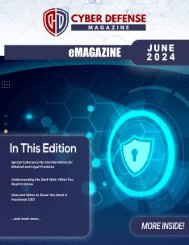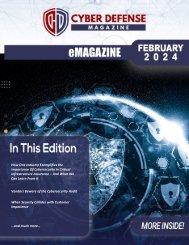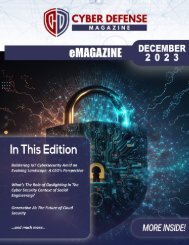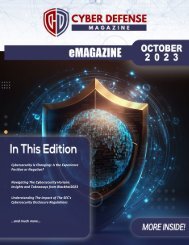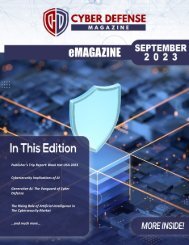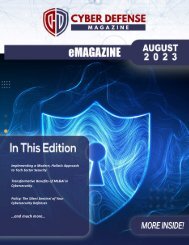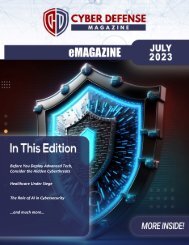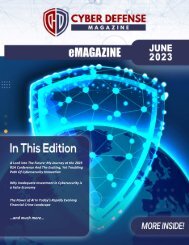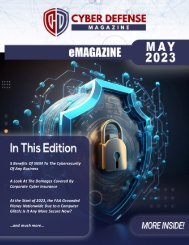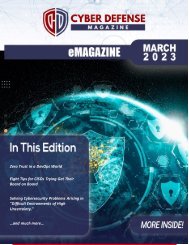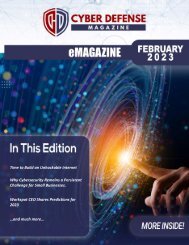Cyber Defense eMagazine December 2019
Cyber Defense eMagazine January Edition for 2020 #CDM #CYBERDEFENSEMAG @CyberDefenseMag by @Miliefsky a world-renowned cyber security expert and the Publisher of Cyber Defense Magazine as part of the Cyber Defense Media Group with Pierluigi Paganini, Yan Ross as International and US Editors-in-Chief and many more hard working amazing contributors!
Cyber Defense eMagazine January Edition for 2020 #CDM #CYBERDEFENSEMAG @CyberDefenseMag by @Miliefsky a world-renowned cyber security expert and the Publisher of Cyber Defense Magazine as part of the Cyber Defense Media Group with Pierluigi Paganini, Yan Ross as International and US Editors-in-Chief and many more hard working amazing contributors!
Create successful ePaper yourself
Turn your PDF publications into a flip-book with our unique Google optimized e-Paper software.
115<br />
for spying, snooping, and third-party interferences on your activity so you can safely enjoy the perks of<br />
public Wi-Fi without worrying about prying eyes.<br />
There are a number of free and paid VPN solutions available. Free VPNs reduce the risks associated<br />
with public Wi-Fi, however, they also have security limitations. For this reason, it’s much better to invest<br />
in a paid VPN service to ensure maximum protection. Study the tariffs of ProtonVPN and you’ll see how<br />
cheap VPN providers might be.<br />
2. Password Protected Public Wi-Fi<br />
Most public Wi-Fi is not password protected, however, there are a few businesses that offer passwordsecured<br />
Wi-Fi. These businesses provide you with a password on request and are safer than using open<br />
public Wi-Fi.<br />
There are two benefits of password-secured Wi-Fi. First, the password is provided only on request and<br />
there are a limited number of users connected to the wireless portal, reducing the chances of cyber<br />
criminals and predators scanning for hacking opportunities. Second, it’s not unusual for cyber criminals<br />
to set up fake public Wi-Fi portals and deploy them in busy areas to lure users into thinking they are the<br />
real thing. The names of these fake wireless portals are typically very similar to legitimate networks in<br />
the vicinity, for example, “Free Starbucks Wi-Fi” alongside Starbucks Wi-Fi. Criminals use these fake<br />
wireless portals to scoop up the personal data of people who are fooled into using them. Fake portals<br />
aren’t password protected, however, so if you have the option of using password protected Wi-Fi there<br />
is much less chance of falling prey to a fake public hotspot.<br />
3. Turn Off Wi-Fi<br />
Many people like to set their device to auto connect to Wi-Fi so they can automatically connect to a<br />
network as soon as they are in range. This practice is safe when at home or in the workplace and the<br />
connections are secure, but it can make your device vulnerable if you are in public places.<br />
There are several malicious and fake public Wi-Fi hotspots operated for the sole purpose of hacking and<br />
hi-jacking data. If your device automatically connects to one of these networks there is a high probability<br />
your device will be infected with malware designed to steal online and offline data. Turning the Wi-Fi auto<br />
connect functionality off when you are in public places can help protect your device and data.<br />
4. Anti-Virus<br />
There are loads of viruses that can attack your device when you click on malicious links. These links are<br />
often disguised masquerading as a system upgrade, for instance, and are not easy to detect. Being<br />
cautious about the links you click on can help keep your device safe, but when you are connected to<br />
public Wi-Fi you are at increased risk of malware. Alarmingly, even a single device on a Wi-Fi connection<br />
that contains malware can automatically infect all the other devices that also connect to the network.<br />
Anti-virus is essential to protect your devices and keep them safe from malware and viruses. AV software<br />
will notify you about invading malware and block it from accessing your device, and alert you about<br />
suspicious links as well as any other unusual activity within your device. Installing and actively using AV<br />
software dramatically reduces security threats to your devices and data.




